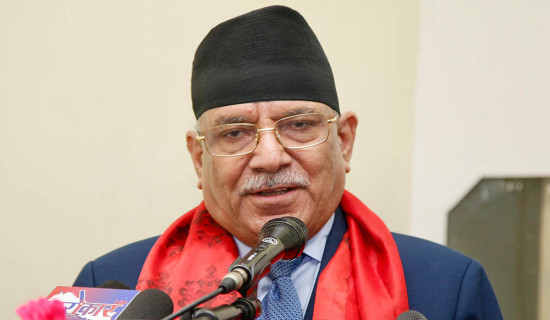- Wednesday, 20 August 2025
Parties Must Pass Anti-usury Bill
Loan shark victims across Nepal have yet to get justice in the absence of a law required to deal with the issue of usury. As per an agreement signed with the representatives of the agitating victims of the bad practice of loan-sharking, the federal government had issued an ordinance more than two months back to have a law in place through fast-track. Any ordinance needs to be approved by the legislature within 60 days from the date of its issuance for it to be a law. On July 5, the House of Representatives was scheduled to approve that ordinance. But it failed to do so because of an obstruction created by the opposition political parties, including CPN-UML and Rastriya Swatantra Party (RSP). The ordinance became null and void because it could not get a go-ahead from the House even on the 60th day of its emergence.
With that incidence, those opposition parties were criticised by different sections of the society, including the victims of usury, for getting that important ordinance annulled. Had the parliament approved that bill, it would have been easier for the government to take action against those who have exploited many common people. But the opposition parties blamed the government for tabling the ordinance in parliament for endorsement only on the 60th day of its issuance. The CPN-UML has claimed that it was not against the bill. However, the party does not seem to be so serious about getting through the bill from parliament. There is no coherence in its words and action. Recently, the RSP warned that it would not allow the operation of the House if the government did not table the bill related to loan-sharking in it immediately.
Lengthy procedures
It is sad to note that even the RSP was involved in the obstruction of the parliament on the day when that bill was in the process of being endorsed. It appears that the political parties speak in favour of the bill just for public consumption. However, the government is determined to move the bill ahead as it is under pressure from the usury victims as well. Deputy Prime Minister and Home Minister Narayan Kaji Shrestha, the other day, said that the bill would be tabled soon in parliament without making any revision. Before the issuance of the ordinance, the Ministry of Law, Justice and Parliamentary Affairs had initiated the process of making a law to tackle the problems facing the loan shark victims by registering a bill in the National Assembly. Any ordinary bill registered in the parliament requires going through lengthy procedures prior to its endorsement.
Therefore, realising the urgency of the law related to usury, the government had introduced a replacement bill in the House. As a financial crime, loan-sharking is ubiquitous in most Terai districts. Under this traditional moneylending practice, landlords give money to borrowers at exceedingly high rates of interest. With no any source of income, the poor and unemployed people have no alternative but to get loans from the property-owners to run their day-to-day life. Some of them also receive credits to invest in their children’s education or begin a startup business or go abroad in the pursuit of a job. They are forced to fall prey to the loan sharks because of lack of their access to banks and other financial institutions.
Even if such institutions are available in their door steps, those who are in need of credits find it easy to approach the local loan sharks. This is because of lengthy procedural hassles the debtors have to go through in the course of receiving loans. Meanwhile, the government's commitment to cracking down on the loan-sharking is reflected in its initiative to form a three-member commission under Gauri Bahadur Karki, a former Special Court judge. The Loan Shark Probe Commission that has formed about three months ago has collected many complaints from those who were exploited by loan sharks. The problem of loan-sharking has left many debtors in the lurch. Some of them have been rendered homeless while others have lost their lands and other properties. The government's step taken to manage the issue of usury has now become effective even when there is no related law in place.
Settlement
Based in Janakpur, the commission has collected a total of 23,959 complaints from various parts of the country. According to the commission, Bara has been the most usury-hit district where as many as 3,322 complaints have been recorded. The number of complaints the investigation authority has received from Siraha, Dhanusha, Mahottari and Rautahat districts stands at 2,920, 2,615, 2,336 and 2,078, respectively. But the commission has not got any complaint related to usury from 22 districts. These districts include Taplejung, Tehrathum, Dhankuta, Solukhumbu, Rasuwa, Manang, Mustang, Myagdi, Palpa, Gulmi, Rukum (East), Rukum (West), Dolpa, Humla, Mugu, Bajura, Bajhang, Dailekh, Darchula, Achham, Baitadi and Doti.
Of the total number of complaints, the investigation panel has so far been able to settle 1,880 cases on the basis of mutual understanding between the debtors and moneylenders. As of now, the victims have got back well over 41 bighas of land. However, the commission has yet to probe into more than 90 per cent of cases. It is encouraging to mention that many other complaints are also in the process of being settled through common understanding between the two sides. However, the problem of usury can be tackled permanently only when an effective law is in place and it is implemented strictly. The political parties need to stand united to deal with pertinent issues like usury permanently.
(The author is a deputy executive editor of this daily.)

















